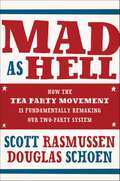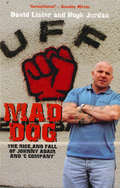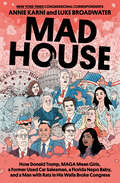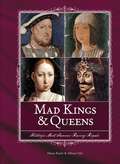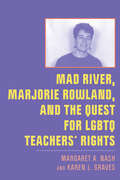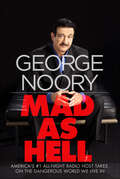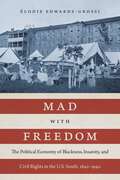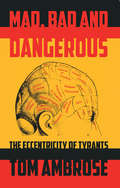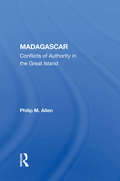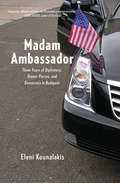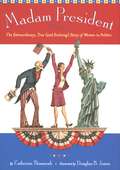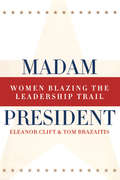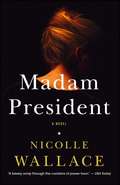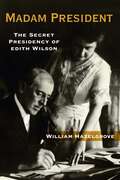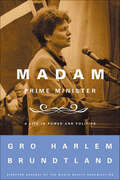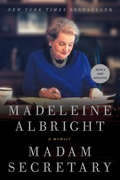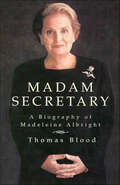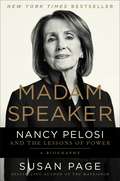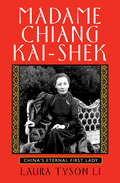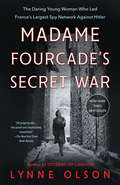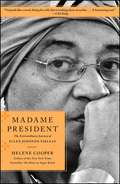- Table View
- List View
Mad As Hell: How the Tea Party Movement Is Fundamentally Remaking Our Two-Party System
by Douglas Schoen Scott RasmussenToday’s raucous revolt against Washington and Wall Street is a classic populist uprising. In Mad as Hell, political pollsters Scott Rasmussen and Doug Schoen discuss how the Tea Party movement is fundamentally remaking our two-party system and what it means for the future of American politics. For political junkies of every stripe—from both the left and the right side of the aisle—Mad as Hell is mandatory reading.
Mad As Hell: Revolt at the Ballot Box
by Jules Witcover Jack W. GermondAnalysis of the 1992 Presidential Election Campaign.
Mad Dog: The Rise and Fall of Johnny Adair and 'C Company'
by David Lister Hugh JordanA mindless sectarian psychopath or a loyalist folk hero who took the war to the IRA's front door? The name Johnny 'Mad Dog' Adair is synonymous with a killing spree by loyalist terrorists that took Northern Ireland to the brink of civil war.From humble beginnings as a rioter and glue-sniffer on Belfast's Shankill Road, Adair rose through the ranks of the outlawed Ulster Freedom Fighters to head its merciless killing machine, 'C Company'. Surrounded by a group of trusted friends, his reign of terror in the early 1990s claimed the lives of up to 40 Catholics, picked out at random as Adair's hitmen roamed Belfast. Determined to lead from the front, his men even fired a rocket at Sinn Fein's headquarters, writing themselves into loyalist mythology and embarrassing the IRA in its republican heartland. Its desperate attempts to kill Adair culminated in October 1993, when a bomb on the Shankill Road, intended for the loyalist godfather, claimed the lives of nine Protestant civilians. Mad Dog: The Rise and Fall of Johnny Adair and 'C Company' describes in graphic detail Adair's criminal empire and an egomaniac's bloody war against Catholics and anybody else who got in his way. Adair's friends and enemies talk for the first time about the murders he ordered, his sordid personal life, and his attempts - ultimately disastrous - to become Northern Ireland's supreme loyalist figurehead.
Mad House: How Donald Trump, MAGA Mean Girls, a Former Used Car Salesman, a Florida Nepo Baby, and a Man with Rats in His Walls Broke Congress
by Annie Karni Luke BroadwaterAn exclusive fly-on-the-wall account of the epic dysfunction of the American Congress, from the rotating cast of failed Speakers to the MAGA efforts to impeach President Joe Biden to the insanity of the 2024 presidential race—by the star congressional reporters at The New York Times. <p> “Mad House contains cyanide and candy on every page, which proves to be a killer combo. I loved it.”—Mark Leibovich, author of the #1 New York Times bestsellers This Town and Thank You for Your Servitude. <p> The United States Congress has always been messy and far-from-august, but as Annie Karni and Luke Broadwater show here, in scorching, shocking detail, it has reached some kind of chaotic bottom. The anarchy that reigned over Congress’s lower chamber in the wake of the January 6th attack on the Capitol Building—the election of serial liar and con-man George Santos, revenge porn being shown on the floor of the house, and the theatrical high jinks of Lauren Boebert—all were a sign of decay and dysfunction of the highest order. <p> Even the members of the 118th Congress would admit it was a circus—but up close, the spectacle was more alarming than funny. Taking the reader into closed door meetings as House Republicans, in thrall to a cult of personality, bumble ever deeper into extremism, and sniping House Democrats lose faith in their President, the authors reveal a level of disorder that we have never seen before. <p> Mad House is a searing, rollicking, and deeply reported portrait of a body at war with itself, riven by pettiness, egomania, and score-settling, and defined by the truly unbelievable antics of people like Matt Gaetz, Marjorie Taylor Greene, and Jim Jordan, who, handed the reins of power, attempted to actually govern a country. They did the bare minimum but voters in the 2024 elections rewarded them nonetheless, giving MAGA Republicans control of the White House, the Senate, and the House—and delivering to President Donald Trump a malleable Congress of loyalists there to serve. If you want a peek at what the next four years might look like, there’s no better place to start than the dysfunction that led us here. <b>New York Times Bestseller</b>
Mad Kings & Queens: History's Most Famous Raving Royals
by Alison Rattle Allison ValeA frank and fascinating history of forty of Europe’s most loony, deluded, and downright dangerous monarchs.In Mad Kings & Queens co-authors Alison Rattle and Allison Vale reveal a legion of kings and queens who have abused the pedestal of power in spectacular style. The respectability of the royal position is well and truly tossed aside by the whimsy and wanton depravity of these mad European monarchs, including:The queen who murdered her husband with a red-hot spit.The bloodthirsty monarch who impaled tens of thousands of his subjects.The vampiric ruler who bathed in the blood of young women.The king of excess who beheaded his wives.Mad Kings and Queens explores seven hundred years of royal eccentricity, detailing a catalogue of madness and exploring the finer intricacies of royal breeding that lay at its root.
Mad Politics
by Gina LoudonIf the definition of insanity is doing the same thing over and over and expecting a different result, America has been insane for decades. We've elected establishment politicians on both sides of the aisle; we've hoped for change; and we've been disappointed. But with the election of Donald Trump, America tried something new. So we have to ask ourselves: what if Trump isn't the crazy man that the media pretends he is? What if he's actually the cure for a country who's been going mad for years? In Mad Politics, Fox News commentator, radio host, and psychological analyst Dr. Gina Loudon diagnoses the problem with America's status quo politics. Loudon has unique insight into both the Trump campaign and the larger political landscape as a member of the president's 2020 media advisory board, a former surrogate for his campaign, the wife of a former Senator from Missouri, the co-host of a national Television show, a seasoned psychological analyst on FOX News, CNN and others, and a twice pedigreed Master and Ph.D. With authority and wit, Mad Politics exposes cultural patterns that have led to today's political narcissism. She scans the psychological literature and illuminates a formula to answer the question: How can we restore a sound mind to the body politic? The answer, Loudon concludes, may be in joining Trump in a complete rejection of political correctness.
Mad River, Marjorie Rowland, and the Quest for LGBTQ Teachers’ Rights (New Directions in the History of Education)
by Margaret A. Nash Karen L. GravesMad River, Marjorie Rowland, and the Quest for LGBTQ Teachers’ Rights addresses an important legal case that set the stage for today’s LGBTQ civil rights–a case that almost no one has heard of. Marjorie Rowland v. Mad River School District involves an Ohio guidance counselor fired in 1974 for being bisexual. Rowland’s case made it to the U.S. Supreme Court, but the justices declined to consider it. In a spectacular published dissent, Justice Brennan laid out arguments for why the First and Fourteenth Amendments apply to bisexuals, gays, and lesbians. That dissent has been the foundation for LGBTQ civil rights advances since. In the first in-depth treatment of this foundational legal case, authors Margaret A. Nash and Karen L. Graves tell the story of that case and of Marjorie Rowland, the pioneer who fought for employment rights for LGBTQ educators and who paid a heavy price for that fight. It brings the story of LGBTQ educators’ rights to the present, including commentary on Bostock v Clayton County, the 2020 Supreme Court case that struck down employment discrimination against LGBT workers.
Mad as Hell: America's #1 All-Night Radio Host Takes on the Dangerous World We Live In
by George NooryAs the candidacies of Donald Trump and Bernie Sanders have proven, Americans are mad as hell about the problems facing our country. George Noory hears these problems every night, all night, and this is how he would deal with them. This is Mad as Hell.---I’m angry because sometimes I feel like a stranger in America. We live in a dangerous world that is sorely in need of an effective political system that deals with the ongoing destruction of the middle class, an aging population, permeable borders, technology out of control, and shocking, mindless violence and wars. But we can bring back the America that makes us proud. It will take hard work and pulling together as a society.People are stressed because they don’t know where the world is heading or where it is taking them. With a radio show heard by millions, I consider myself not an entertainer or someone to dictate how we should live, but a facilitator who can help guide the path chosen.I have been called a voice in the darkness. The concepts I deal with are not only on the cutting edge of science and technology, but with subjects as provocative as aliens and angels, as challenging as supervolcanos and the fire and brimstone of the End Time.Join me by reading why I am mad . . . and maybe you will get as angry as I am about conditions in the country we love.At the Publisher's request, this title is being sold without Digital Rights Management Software (DRM) applied.
Mad with Freedom: The Political Economy of Blackness, Insanity, and Civil Rights in the U.S. South, 1840–1940
by Élodie Edwards-GrossiThe use of race in studies of insanity in the 1840s and 1850s gave rise to politically charged theories on the differential biology and pathologies of brains in whites and Blacks. In Mad with Freedom, Élodie Edwards-Grossi explores the largely unknown social history of these racialized theories on insanity in the segregated South. She unites an institutional history of psychiatric spaces in the South that housed Black patients with an intellectual history of early psychiatric theories that defined the Black body as a locus for specific pathologies. Edwards-Grossi also reveals the subtle, localized techniques of resistance later employed by Black patients to confront medical power. Her work shows the continuous politicization of science and theories on insanity in the context of Reconstruction and the Jim Crow South.
Mad, Bad and Dangerous: The Eccentricity of Tyrants
by Tom AmbroseA penetrating and incisive study of the fanaticism and foibles of some of history's most illustrious namesFrom Assad to Nero, Gaddafi to Ivan The Terrible, this work attempts a thorough illumination of the minds of some of the most powerful people in history. While leaving some room to describe the amusing incidents and eccentricities associated with a host of men and women of power, it also reaches into the terrifying depths and depravities of minds that shaped the destinies of peoples and nations. Using a unique combination of history, politics, and psychology, this book fully describes how power not only corrupts but deranges.
Madagascar: Conflicts Of Authority In The Great Island (G - Reference, Information And Interdisciplinary Subjects Ser. #No. 98)
by Philip M. AllenThe world's fourth largest island, with a unique biological and physical endowment, Madagascar is home to an extraordinary insular civilization that has struggled for more than a century against external domination. In this sensitive introduction to the Indian Ocean's "great island," Philip Allen shows how family affinities and community loyalties at the foundation of Madagascar's culture have influenced Malagasy nationalism and forged islandwide traditions. These same principles have nonetheless engendered social cleavages and resistance to economic and political change. In chapters on modern Madagascar, Allen analyzes the inability of a series of regimes to maintain authority among a people deeply bound to rituals of communication with their spiritual environment. He demonstrates how the first Malagasy Republic became stigmatized by its lingering identification with French colonialism and how the nationalist revolution in 1972 soon hardened into autocratic radicalism. Allen explores the complex challenges facing Madagascar's resurgent democratic forces–including a need to conserve the island's irreplaceable biodiversity and to facilitate authentic participation in public affairs without offending ancestral customs and local precedents. Finally, he discusses efforts to end Madagascar's economic and political dependence and to improve living conditions for its tragically impoverished population.
Madagascar: Third Review Under the Poverty Reduction and Growth Facility--Staff Report; Staff Statement; and Press Release on the Executive Board Discussion
by International Monetary FundA report from the International Monetary Fund.
Madam Ambassador
by Eleni KounalakisA helicopter ride to visit troops in the Afghanistan war zone, a tense meeting with the newly elected Prime Minister, and...a wild boar hunt! Eleni Kounalakis was forty-three and a land developer in Sacramento, California, when she was tapped by President Barack Obama to serve as the U.S. ambassador to Hungary under Secretary of State Hillary Clinton. During her tenure, from 2010 to 2013, Hungary was a key ally in the U.S. military surge, held elections in which a center-right candidate gained a two-thirds supermajority and rewrote the country's constitution, and grappled with the rise of Hungarian nationalism and anti-semitism.The first Greek-American woman ever to serve as a U.S. ambassador, Kounalakis recounts her training at the State Department's "charm school" and her three years of diplomatic life in Budapest--from protocols about seating, salutations, and embassy security to what to do when the deposed King of Greece hands you a small chocolate crown (eat it, of course!). A cross between a foreign policy memoir and an inspiring personal family story--her immigrant Greek father went from agricultural day laborer to land developer and major Democratic party activist--Madam Ambassador draws back the curtain on what it is like to represent the U.S. government abroad as well as how American embassies around the world function.
Madam President
by Douglas B. Jones Catherine ThimmeshCatherine Thimmesh's inspiring look at the role of women in American politics-past, present, and future-is now available with updated sections on Hillary Rodham Clinton, Condoleezza Rice, and Nancy Pelosi. From the time our government was being formed, women have fought their way from behind the scenes to the center of power and decision making. So, why not a woman in the White House? Two thousand eight may be the year!
Madam President, Revised Edition: Women Blazing the Leadership Trail (American History Ser.)
by Eleanor Clift Tom BrazaitisFirst Published in 2003. Routledge is an imprint of Taylor & Francis, an informa company.
Madam President: A Novel
by Nicolle WallaceWith Madam President, current cohost of The View and former White House Communications Director Nicolle Wallace returns with an electrifying portrait of three powerful women on a day that will change the country forever.Charlotte Kramer, the forty-fifth President of the United States, has done the unprecedented in allowing a network news team to document a day in her life--and that of her most senior staff. But while twenty news cameras are embedded with the president, the unthinkable happens: five major attacks are leveled on US soil. Her secretary of defense, Melanie, and her press secretary, Dale, must instantly jump to action in supporting the president and reassuring the country that the safety they treasure is in capable hands. But secrets have always thrived in President Kramer's White House. With all eyes on them and America's stability on the line, all three women are hiding personal and professional secrets that could rock the West Wing to its very foundations...and change the lives of the people they love most. With an insider's sharp eye and her trademark winning prose, Nicolle Wallace delivers a timely novel of domestic and political intrigue that is impossible to put down.
Madam President: The Secret Presidency of Edith Wilson
by William HazelgroveAfter President Woodrow Wilson suffered a paralyzing stroke in the fall of 1919, his wife, First Lady Edith Wilson, began to handle the day-to-day responsibilities of the Executive Office. <P><P>Mrs. Wilson had had little formal education and had only been married to President Wilson for four years; yet, in the tenuous peace following the end of World War I, Mrs. Wilson assumed the authority of the office of the president, reading all correspondence intended for her bedridden husband and assuming his role for seventeen long months. <P><P>Though her Oval Office presence was acknowledged in Washington, D.C. circles at the time-one senator called her "the Presidentress who had fulfilled the dream of suffragettes by changing her title from First Lady to Acting First Man"-her legacy as "First Woman President" is now largely forgotten. <P><P>William Hazelgrove's Madam President is a vivid, engaging portrait of the woman who became the acting President of the United States in 1919, months before women officially won the right to vote.
Madam Prime Minister: A Life in Power and Politics
by Gro Harlem BrundtlandOne of the world's leading woman politicians tells her inspiring storyAt forty-one, Gro Harlem Brundtland, physician and mother of four, was appointed prime minister of Norway-the youngest person and the first woman ever to hold that office. In this refreshingly forthright memoir, Brundtland traces her unusual and meteoric career. She grew up with strong role models-her parents were active in the Norwegian resistance and involved in postwar politics. She became known as a pro-choice crusader in the seventies and entered politics as the minister of the environment. She appointed eight women to her second eighteen-member cabinet, to this day a world record, and was the leading figure in the process that led to the Earth Summit in Rio in 1992. As director-general of the World Health Organization since 1997, Brundtland is the first woman elected to run a major UN institution. Along the way, she met a host of international politicians, including Margaret Thatcher-who did not share Brundtland's view on feminism-Mikhail Gorbachev, Nelson Mandela, Ronald Reagan, and Hillary Clinton.Brundtland writes candidly and with humor about raising children in the political limelight and about dealing with political opposition and stereotypes about women. Hers is a fascinating story of one person's ability to make a difference-globally.
Madam Secretary
by Madeleine AlbrightMadeleine Albright was for eight years during the first and second Clinton terms privy to some of the most fascinating and controversial episodes in recent memory. Her refreshingly candid memoir brings to life the world leaders with whom she worked and the joys and difficulties of her own private life: her daughters, the painful break-up of her marriage, and the discovery late in life of her Jewish grandparents' fate. Weaving together the public and the private, the national and the intimate, Madam Secretary is a valuable contribution to political history and destined to become a classic of its kind. 'It is a mark of the excellence of this memoir by the highest-ranking woman in American history . . . that it could not have been written by a man . . . Ms Albright’s authentic voice is vivid . . . [an] unusually honest book' Jonathan Mirsky, Spectator 'It is fashionable in some of the more rabid right-wing Washington salons to look at the Clinton years as ones of drift and equivocation. [ Madam Secretary] makes a case for the defence - in foreign policy at least - that largely avoids the partisan sniping . . . If that were this book's only quality it would be worth noting' Alex Massie,Scotland on Sunday
Madam Secretary: A Biography of Madeleine Albright
by Thomas BloodThomas Blood’s Madame Secretary is a riveting biography of the first woman U. S. Secretary of State, Madeline Albright, “the ultimate independent woman” (The New York Times Magazine).No American envoy has ever burst on the diplomatic scene and grabbed center stage in the theater of foreign relations like Madeleine Albright. Navigating difficult terrain as few can, Washington D. C. insider Thomas Blood provides exclusive interviews with, and revealing anecdotes from, politicians, friends, adversaries, and colleagues, including former Secretary of State Warren Christopher, Senators Leahy, Mikulski, Kerrey, Helms, Reid, and Rockefeller, and House Minority Leader Dick Gephardt.This unique biography reveals the dramatic story of the first woman U.S. Secretary of State. Rather than providing a simple chronology, Blood focuses on the defining moments in Madeleine Albright’s life, identifying the periods that best open a window on the Secretary of State’s uncanny ability to triumph over adversity, her unparalleled success in politics and her meteoric rise to dominance in the world of foreign policy. From her family’s thrilling escape from Czechoslovakia to her astounding rise to power to her victories and setbacks as the head of American foreign policy, Madeleine Albright’s life unfolds like a major motion picture.An immensely readable biography that illuminates key experiences in Albright’s career and personal life, Madam Secretary introduces us to Madeleine Albright the person, the politician, the policymaker.
Madam Speaker: Nancy Pelosi and the Lessons of Power
by Susan PageThe definitive biography of Nancy Pelosi, the most powerful woman in American political history, written by New York Times bestselling author and USA Today Washington bureau chief Susan Page. <P><P>Featuring more than 150 exclusive interviews with those who know her best—and a series of in-depth, news-making interviews with Pelosi herself—MADAM SPEAKER is unprecedented in the scope of its exploration of Nancy Pelosi’s remarkable life and of her indelible impact on American politics. <P><P>Before she was Nancy Pelosi, she was Nancy D’Alesandro. Her father was a big-city mayor and her mother his political organizer; when she encouraged her young daughter to become a nun, Nancy told her mother that being a priest sounded more appealing. She didn’t begin running for office until she was forty-six years old, her five children mostly out of the nest. <P><P>With that, she found her calling. Nancy Pelosi has lived on the cutting edge of the revolution in both women’s roles and in the nation’s movement to a fiercer and more polarized politics. She has established herself as a crucial friend or formidable foe to U.S. presidents, a master legislator, and an indefatigable political warrior. She took on the Democratic establishment to become the first female Speaker of the House, then battled rivals on the left and right to consolidate her power. She has soared in the sharp-edged inside game of politics, though she has struggled in the outside game—demonized by conservatives, second-guessed by progressives, and routinely underestimated by nearly everyone. <P><P>All of this was preparation for the most historic challenge she would ever face, at a time she had been privately planning her retirement. When Donald Trump was elected to the White House, Nancy Pelosi became the Democratic counterpart best able to stand up to the disruptive president and to get under his skin. The battle between Trump and Pelosi, chronicled in this book with behind-the-scenes details and revelations, stands to be the titanic political struggle of our time. <P><P><b>A New York Times Best Seller</b>
Madam Speaker: Nancy Pelosi's Life, Times, and Rise to Power
by Marc SandalowUnthinkable just a generation ago, Hillary Clinton's run for the presidency and Nancy Pelosi's ascension to Speaker of the House have cast the spotlight on American political women as never before. In the 230 years of this country's history, never has a woman—let alone a mother and a grandmother—risen to such a position of power as Nancy Pelosi did when she assumed her role as the first female Speaker of the House, third in line for the presidency. In Madam Speaker, Marc Sandalow, an esteemed journalist and political analyst who covered Pelosi for decades, offers a richly nuanced portrait of the woman who made history. He charts Pelosi's political roots, honing in on her father, who spent five terms in Congress and stored hundreds of copies of the Congressional Record under her bed, and goes on to examine how Pelosi, who didn't run for political office until she was 47 years old, juggled her family life and fought hard to forge a place for herself in Washington, ultimately becoming one of the most influential voices in our nation. Based on hundreds of interviews with Pelosi's colleagues, family, and friends—and the Speaker herself—Sandalow culls together insightful anecdotes and political analysis to chronicle Pelosi's meteoric rise and controversial tenure. Madam Speaker illuminates the inspiring life of a woman who has already made history.
Madame Chiang Kai-shek: China's Eternal First Lady (Biography And Memoir Ser.)
by Laura Tyson LiThe first biography of one of the most controversial and fascinating women of the twentieth century. Beautiful, brilliant, and captivating, Madame Chiang Kai-shek seized unprecedented power during China&’s long and violent civil war. She passionately argued against Chinese Communism in the international arena and influenced decades of Sino-American relations and modern Chinese history. Raised in one of China&’s most powerful families and educated at Wellesley College, Soong Mayling went on to become wife, chief adviser, interpreter, and propagandist to Nationalist leader Generalissimo Chiang Kai-shek. She sparred with international leaders like Churchill and Roosevelt, and impressed Westerners and Chinese alike with her acumen, charm, and glamour. But she was also decried as a manipulative Dragon Lady,&” and despised for living in American-style splendor while Chinese citizens suffered under her husband&’s brutal oppression. The result of years of extensive research in the United States and abroad, and written with access to previously classified CIA and diplomatic files, Madame Chiang Kai-shek objectively evaluates one of the most powerful and fascinating women of the twentieth century. &“Li brilliantly analyzes a fearless and profoundly conflicted woman of extraordinary force.&” —Booklist
Madame Fourcade's Secret War: The Daring Young Woman Who Led France's Largest Spy Network Against Hitler
by Lynne OlsonThe little-known true story of Marie-Madeleine Fourcade, the woman who headed the largest spy network in occupied France during World War II, from the bestselling author of Citizens of London and Last Hope Island <P><P> In 1941 a thirty-one-year-old Frenchwoman, a young mother born to privilege and known for her beauty and glamour, became the leader of a vast intelligence organization—the only woman to serve as a chef de résistance during the war. <P><P>Strong-willed, independent, and a lifelong rebel against her country’s conservative, patriarchal society, Marie-Madeleine Fourcade was temperamentally made for the job. Her group’s name was Alliance, but the Gestapo dubbed it Noah’s Ark because its agents used the names of animals as their aliases. The name Marie-Madeleine chose for herself was Hedgehog: a tough little animal, unthreatening in appearance, that, as a colleague of hers put it, “even a lion would hesitate to bite.” <P><P>No other French spy network lasted as long or supplied as much crucial intelligence—including providing American and British military commanders with a 55-foot-long map of the beaches and roads on which the Allies would land on D-Day—as Alliance. <P><P>The Gestapo pursued them relentlessly, capturing, torturing, and executing hundreds of its three thousand agents, including Fourcade’s own lover and many of her key spies. <P><P>Although Fourcade, the mother of two young children, moved her headquarters every few weeks, constantly changing her hair color, clothing, and identity, she was captured twice by the Nazis. <P><P>Both times she managed to escape—once by slipping naked through the bars of her jail cell—and continued to hold her network together even as it repeatedly threatened to crumble around her. <P><P>Now, in this dramatic account of the war that split France in two and forced its people to live side by side with their hated German occupiers, Lynne Olson tells the fascinating story of a woman who stood up for her nation, her fellow citizens, and herself. <P><b>A New York Times Bestseller</b>
Madame President: The Extraordinary Journey of Ellen Johnson Sirleaf
by Helene CooperThe harrowing, but triumphant story of Ellen Johnson Sirleaf, leader of the Liberian women’s movement, winner of the Nobel Peace Prize, and the first democratically elected female president in African history.When Ellen Johnson Sirleaf won the 2005 Liberian presidential election, she demolished a barrier few thought possible, obliterating centuries of patriarchal rule to become the first female elected head of state in Africa’s history. Madame President is the inspiring, often heartbreaking story of Sirleaf’s evolution from an ordinary Liberian mother of four boys to international banking executive, from a victim of domestic violence to a political icon, from a post-war president to a Nobel Peace Prize winner. Pulitzer Prize–winning journalist and bestselling author Helene Cooper deftly weaves Sirleaf’s personal story into the larger narrative of the coming of age of Liberian women. The highs and lows of Sirleaf’s life are filled with indelible images; from imprisonment in a jail cell for standing up to Liberia’s military government to addressing the United States Congress, from reeling under the onslaught of the Ebola pandemic to signing a deal with Hillary Clinton when she was still Secretary of State that enshrined American support for Liberia’s future. Sirleaf’s personality shines throughout this riveting biography. Ultimately, Madame President is the story of Liberia’s greatest daughter, and the universal lessons we can all learn from this “Oracle” of African women.
